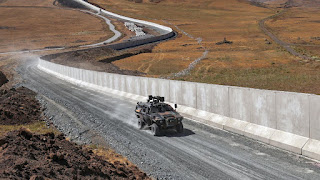On October 27, 2021 SEESOX organised its first seminar of the academic year entitled “Afghan crisis, migration diplomacy and Turkey-EU relations” in the context of the SEESOX project on Turkey’s Migration Diplomacy supported by the Oxford-Berlin Partnership. The speakers included Franck Duvell (Universitat Osnabrück), Başak Kale (METU) and Kemal Kirişçi (Brookings Institution) and the panel was chaired by Othon Anastasakis (SEESOX) and Mehmet Karli (SEESOX).
The panel looked into the recent migration developments between the EU and Turkey, taking into consideration the follow up negotiations to the EU-Turkey 2016 migration deal, the impact of the summer 2021 Afghan crisis on the refugee flow via Turkey and the ongoing Turkish complaints calling out the EU for failing to share its burden of hosting refugees and to keep to its commitment on visa free travel. In light of these issues, the panel reviewed the current state of migration diplomacies between the EU and Turkey, looked at the prospects of the migration deal and evaluated the impact of the prevailing transactionalism over the EU-Turkey relations in general.
Basak Kale started by presenting a brief historical account of the last 15 years on the issue of EU-Turkey migration relations claiming that the migration issue has come to dominate relations since the 2016 deal and by looking at the positive and negative repercussions of this deal. She reminded us that the deal was not a treaty or a formal document but a statement whose validity could be questioned because it was not ratified by the European Parliament. She also emphasised the transactional nature of the deal, instrumentalising the refugees and leaving open various legal and humanitarian issues. She concluded that the statement triggered changes in Turkey regarding the management of the refugees, and in terms of their integration into Turkey’s labour force, where a limited number of work permits having been issued and mostly an informal integration has taken place. Franck Duvell focused on the impact of the Afghan crisis and how this affected Turkey-EU relations. He pointed that the Afghan forced migration historically is the biggest in the world since the Soviet invasion in Afghanistan. The recent crisis initially made big headlines in Turkey expecting big numbers (in the millions) of refugees to go through the country on their way to Europe but which have not materialised so far and the numbers that have actually gone through Turkey are much lower in the tens of thousands. In addition, he pointed to the direct sending of refugees to Albania, Kosovo and North Macedonia who have agreed to host some of them, as an interesting development in the process. He also pointed to the development of two interdependent streams of diplomacy between Turkey and the EU, and between Turkey and Iran-Pakistan. He concluded that, Germany and Turkey are on the same wavelength in that they both don’t want to accept any more refugees and how Turkey is itself adopting the externalisation model of the European Union by outsourcing the problem to Iran and Pakistan.
Kemal Kirisci focused on the freedom of movement and visa free travel from Turkey to the EU and why these have not materialised so far? He reminded us that the visa free travel has been in the relations between Turkey and the EU since the 1990s, with asymmetry prevailing whereby some EU citizens could travel to Turkey without visas but which was not reciprocated. The 2016 coup attempt ironically ‘saved’ the EU from offering visa liberalisation and it looks impossible that this will happen anytime soon. He added that at present the EU enjoys greater bargaining power vis a vis Turkey compared with 2015-16 and that Erdogan ‘scored own goal’ when he encouraged refugees to cross the Evros border in February 2019. He added that visa free travel in not a popular issue as it used to be in Turkey especially now that Incomes have decreased and lira is suffering from consecutive devaluations and there are very few Turkish nationals who can travel to EU. He concluded that the Commission has abandoned the idea of using visa free as an instrument of pressure and instead is weaponizing this against Turkey. He predicted that we are going to see further isolation of Turkey now that the world has moved on into the new pandemic threat which makes visa free even more distant as more and more restrictions are put up.
Othon Anastasakis(Director, SEESOX)


No comments:
Post a Comment
Note: only a member of this blog may post a comment.